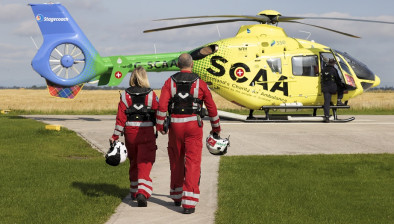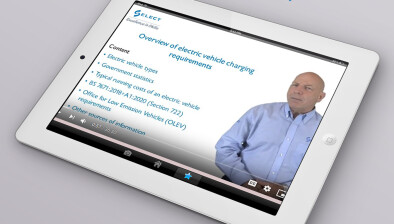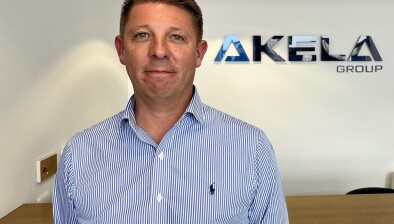Just a Minute with Derek Geyer
Derek Geyer
McLaughlin & Harvey’s head of quality Derek Geyer jumps into the Just a Minute hot seat.
Based in the Glasgow office, Derek leads overall assurance for the group of companies: from certification, training and audits to collaboration in building a positive quality culture.
How did you get started in the industry?
I started at 17 as an apprentice electrician and would never have thought back then that I would ever have achieved such a rewarding position. I was always keen to get involved in doing jobs and 30 years later, there’s no change. Quality was not my first choice, as is the case with most in this profession, however, I have found a role that I love and that keeps me motivated each day.
I worked through the industry as a supervisor, engineer, and project manager and then moved into Quality back in 2016. I feel that I can both communicate with and empathise with every role in construction due to my background.
Biggest professional achievement:
From having no quality qualifications to being a Chartered Member of the CQI (Chartered Quality Institute) in just four years.
Best advice you have received:
When driving quality improvements it has to be ‘It’s always better to ask for forgiveness than permission’ i.e. keep pushing!!! The person who said this will know who they are…
What do you like most about your job?
Every day is different. I naturally like to fix problems and look at new and easier ways of doing things, saving time and money but still delivering high quality. The construction industry is full of great people with years of knowledge making it a great career choice as there is always someone with previous experience you can learn from.
And the least?
The chaos that is the construction industry. There are so many factors (internal and external) that affect the end quality product that we deliver, however, breaking these down into bite sized chunks allows you to make small improvements that all add up to be one big one.
What is your favourite project you have worked on, and why?
My favourite project that I have worked on was the new Donaldson’s School in Linlithgow which is Scotland’s national school for the deaf. Originally situated in Edinburgh’s West End, in the magnificent building that has stood there since 1856, it moved to Linlithgow in 2008. It is a residential and day school that provides education, therapy and care for pupils who are deaf or who have communication difficulties.
It was one of the first large projects I worked on as a project manager and the experience I gained has been invaluable. It was interesting to be part of the construction team on a very unique project, delivering both a modern and functional building to the client.
What (or who) tends to be your main inspiration when it comes to your role?
I’ve had several managers throughout my career, and a few have guided and mentored me to be the best person I can be. I’ve taken lots of individual bits of advice and used them all to get me to where I am now. I thank every one of them for supporting and believing in me.
Is there a project you wish you had delivered, or has particularly stood out to you?
Two spring to mind. Firstly, the Queensferry Crossing in Scotland which replaced the Forth Road Bridge. The amount of design, planning and rerouting of infrastructure in the local area to divert the roads combined with ensuring that all the wind loading and foundations were going to be correct would have been an interesting project to work on.
The second would have been the sarcophagus which encapsulated reactor 4 at Chernobyl. The documentary on the build explained in detail the technical part of the safe containment roof as well as the health and safety challenges of working in a live radioactive environment.
What are the biggest challenges your organisation has faced since the beginning of the Covid-19 pandemic?
There are a few items that have contributed to the biggest challenge. Firstly, on-site productivity due to social distancing and the risk of infection and infecting others. This delayed projects due to the reduced resource that could work safely on site.
Secondly, the availability of materials and goods as a lot of manufacturers in the industry had to close as they were not deemed to be essential workers. This resulted in a high demand with low availability. This resulted in shortages for materials such as plasterboard, render and mortar to name a few which are key building materials which had a direct effect on our projects.
Has anything changed for the better?
Hybrid working and video conferencing. Pre-covid there were only a few industries that utilised video for meetings however, this became a key tool for those who were not able to travel and for anyone that was self-isolating after contracting Covid. Move forward to 2024 and these tools have become the norm and part of everyday life for how we work in construction. It has allowed us to collaborate more easily, reducing our carbon footprint by limiting travel to meetings.
Hobbies and interests:
Anything that is outdoors. Hillwalking (Munro bagging in particular), nature, cycling and camping.
Favourite holiday destination:
It has to be Italy. The architecture is breathtaking, and the food is to die for.
How do you receive your industry news?
My main sources of information are newsletters via email and LinkedIn.
How would you change Scottish Construction Now?
I wouldn’t, it has regular updates of all the key construction matters in Scotland.
Which social media sites do you use, and which do you find the most useful?
The only social media profile I have is through LinkedIn.
- If you or a colleague would like to participate in the feature please contact newsdesk@scottishnews.com.














